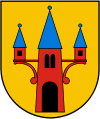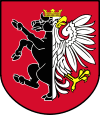Nakło nad Notecią
| Nakło nad Notecią | |||
|---|---|---|---|
| |||
 Nakło nad Notecią | |||
| Coordinates: 53°8′25″N 17°35′34″E / 53.14028°N 17.59278°E | |||
| Country |
| ||
| Voivodeship | Kuyavian-Pomeranian | ||
| County | Nakło | ||
| Gmina | Nakło nad Notecią | ||
| Government | |||
| • Mayor | Sławomir Napierała | ||
| Area | |||
| • Total | 10.62 km2 (4.10 sq mi) | ||
| Population (2006) | |||
| • Total | 19,409 | ||
| • Density | 1,800/km2 (4,700/sq mi) | ||
| Time zone | CET (UTC+1) | ||
| • Summer (DST) | CEST (UTC+2) | ||
| Postal code | 89-100 | ||
| Car plates | CNA | ||
| Website | http://www.naklo.pl | ||
Nakło nad Notecią [ˈnakwɔ ˌnad nɔˈtɛt͡ɕɔ̃] (German: Nakel) is a town in northern Poland on the river Noteć (German: Netze) with 23,687 inhabitants (2007). Since 1999, it has been in the Kuyavian-Pomeranian Voivodeship. It was in Bydgoszcz Voivodeship from 1975 to 1998. It is the seat of Nakło County, and also of the smaller administrative district called Gmina Nakło nad Notecią.
History
Nakło began to develop as a Pomeranian settlement by the middle of the 10th century. Between 1109 and 1113 it fell to Duke Bolesław III Wrymouth of Poland. It received German town law privileges in 1299.
Nakło was annexed by the Kingdom of Prussia during the First Partition of Poland in 1772 and known by the German name Nakel. It began to develop significantly after the completion of the Bydgoszcz Canal, which connected the Vistula with the Noteć, Warta, and Oder Rivers.
After the defeat of Prussia in the Napoleonic War of the Fourth Coalition, Nakło became part of the Duchy of Warsaw in 1807. After the defeat of Napoleon Bonaparte in 1815, it was restored to Prussia in the Congress of Vienna as part of the autonomous Grand Duchy of Posen.
During the course of 19th century industrialization, Nakło developed further after being connected with the Prussian Eastern Railway (Preußische Ostbahn) in 1851. It became part of the Prussian-led German Empire in 1871.
The town became part of the Second Polish Republic according to the Treaty of Versailles following World War I. From 1939 to 1945 Nakło was occupied by Nazi Germany during World War II.
Notable residents
- Nathan Porges (1848–1924), rabbi
- Hermann von Strantz (1853–1936), German general
- Ignaz Jastrow (1856-1937), German economist and historian
- Julius Schwalbe (1863–1930), doctor
- Abraham Buschke (1868-1943), doctor
- Rafał Blechacz (born 1985), classical pianist
See also
| Wikimedia Commons has media related to Nakło nad Notecią. |
Coordinates: 53°08′30″N 17°36′00″E / 53.14167°N 17.60000°E


